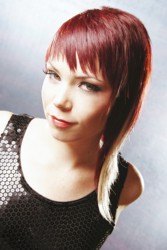|
||||||||||
 |
|
| September 26, 2013 | To ensure delivery of this email, please add newsletter@hairboutiquemedia.com to your contacts. |
Greasy Hair: Causes and Solutions  This Week's 20% Off Coupon: SEPTEMBERSTYLE20 Hair which develops a lank, flat, stringy or oily appearance is often referred to by hairdressers and hair consumers as "greasy" hair. This type of hair is hard to control, clumps together easily and doesn't hold a style well. Origins Of Greasy Hair Where does greasy hair originate from? Regardless of how or why it happens, greasy hair is directly related to the overproduction of sebum, a waxy type of substance naturally occurring in the body which is designed to keep hair supple, soft and waterproof. Sebum is produced by the sebaceous glands. The amount of greasiness that is experienced is directly tied to the amount of oil present on the scalp. People with fine hair tend to have more hair than people with other hair textures. Since there is a higher volume of hair associated with fine textures, there are more sebaceous glands and thus potential for excessive oil production. Hormonal changes are also sometimes linked to the development of greasy hair and skin issues. This is more likely during puberty than menopause. It's believed by some hair experts that long-term greasy hair can lead to other long term hair problems including potential hair loss or some forms of scalp breakouts and/or greasy dandruff. Types Of Greasy Hair Greasy hair can also be a linked to the development of skin problems including acne on the face and scalp. It can be generally categorized into two types which include: 1. Greasy hair from roots to ends with greasy or oily scalp. Causes Of Greasy Hair Although there are always special circumstances, greasy hair can be caused by the following: 1. Genetic predisposition towards greasy, oily scalp that migrates through the hair. Whether there is a genetic predisposition to greasy hair or not, utilizing improper hair care products and/or methods can lead to greasy strands. Irregular hair washing, genetically predisposed to greasiness or not, may result in a greasy condition from oil buildup. Even hair that is predisposed to dryness may actually develop greasy roots from lack of washing. Greasy Hair But Not Oily/Greasy Scalp If you suffer from greasy hair, but not oily scalp, it is most likely that the following conditions are at play: 1. You are using products not right for your hair type. Fine or thin hair can become greasy more easily when heavy conditioners or styling products are used. Greasy Hair Often Linked To Genetics Many hair experts believe that the cause of greasy hair is hereditary. Yes, it is believed to be genetic. The same hair experts do not believe that it's possible to retard the production of oil and grease delivered to the strands through changes in eating habits. During puberty there is a significant marked change in sebum production due to higher levels of hormones. This is why teenagers may go through periods when their hair becomes more greasy and needs to be washed more often. Inadequate removal of the grease makes the problem worse. Factors Making Greasy Hair More Pronounced Perspiration, excessive or not can make greasy hair more pronounced. So can naturally oily skin as well as smog, smoke, environmental toxins and wearing excessive amounts of makeup. Some hair experts definitely believe that spending time in smoke filled bars or other locations will encourage oil and grease to buildup on the skin and migrate to the hair. This is especially true to people genetically predisposed to greasy hair conditions. Greasy hair is more controllable on longer strands since the grease and oil has to go further down the strands to the ends then with medium or shorter hair. Because short or very short hair covers a much smaller area adjacent to the scalp, grease and oils can build up much faster and be a more severe problem. Fine or thin hair may also experience more oil problems than medium or thicker strands. Wavy and curly tresses have less oil problems than naturally straight hair since it is easier for grease and oil to move down straight strands than wavy or curly ones. Celebrities With Greasy Hair In June of 2009 Megan Fox was criticized by the fashion and hair police for walking the Red Carpet at the MTV Awards with greasy, oily hair. Ironically the beautiful Transformers star had grease infused hair as the result of thick hair gel slicked onto her strands by her hairstylist. The 23-year-old later tweeted an apology as a result of her oily strands. “Sorry if you didn’t like my hair. Opinions are opinions,” Fox News quoted her as saying. Jared Leto has also been criticized for having a grease filled messy mop as has Keanu Reeves and Jim Carey. Greasy Hair Shampoo Theories Greasy hair happens when the sebaceous glands on the scalp become overactive. This means that the glands produce too much oil. In a normal environment, the sebaceous glands are designed to produce and secret sebum, which is an oil based matter, which naturally lubricates the hair and skin. Some hair experts believe the best way to deal with greasy hair is to wash your hair every morning with an oil-control hair care product. Many times shampoo products that contain the words "clarify" or "oil reducing" will be most helpful. Other experts suggest that daily washing will only over-stimulate the sebaceous glands causing more grease to be secreted, thus starting a never ending circle where the more frequently you wash, the greasier and oilier the hair becomes. If you are unsure which is the best approach for you to take, try both methods initially to determine which helps the most. Some people with greasy hair actually find that washing daily or even twice daily will do the trick. Others find that waiting as long as possible to shampoo will actually help break the greasiness cycle. How To Shampoo Greasy Strands When applying grease cutting shampoo formulas to greasy strands, make sure that you only focus the product on the areas that are greasy. If that means your scalp and your strands, then apply to both areas. If the greasiness is only on your scalp and not on your strands, focus the grease cutting shampoo only on the scalp area and use a different product for the strands. A common side effect of greasy hair is dried out middle and end sections. This is because in an attempt to control the oily roots, the shampoo designed to remove excessive oils overlaps onto the rest of the hair and removes precious natural oils. Control Greasy Hair Control excessive hair oils and grease by avoiding the following: 1. Moisture enhancing or enriching shampoo products applied to the scalp section of your hair. If your middle or ends are dry or damaged, apply moisture enriched formulas only to the areas of your hair that are excessively dry. Greasy Hair Combat Options To combat excessive oils consider the following options: 1. Shampoo with lukewarm or cool water and avoid hot temperatures. Additional Greasy Hair Treatment Options Some holistic hair and beauty experts believe homeopathic remedies taken by mouth can actually help minimize greasy hair conditions. The remedy Bryonia taken in a remedy of 30c is thought to help in some cases. Other experts believe greasiness is associated with tight sensation in the scalp area which may feel sweaty or clammy. 1. For extra oil removal, leave shampoo on the scalp area to soak in and remove more oil before rinsing. Keep astringent skin care products handy with cotton balls. Dab astringent on cotton balls and then lightly blot the scalp areas where grease is a problem. Avoid allowing astringent to overflow to rest of the hair since astringents can dry out tresses. If you worry about using full strength shampoo, consider using diluted formulas or switch to herbal formulations that include seaweed or rosemary. You may also try a final rinse consisting of lemon or vinegar. Additional Greasy Hair Cures Hair experts suggest greasiness can be tied to some forms of thinning hair. It is believed that the homeopathic remedy Phosphoric can help greasy related conditions. Zinc supplements can be helpful in helping to correct sebum imbalances. Evening Primrose may also provide assistance. Nutritional experts suggest dietary changes which medical professionals may or may not agree. Dietary changes for managing greasy hair includes cutting down on refined carbohydrates such as sweets and carbonated sodas. If the greasy hair problem persists it could be hormonal so consider consulting a medical professional or with a hair specialist who specializes in hair diseases. Summary Greasy hair happens when the sebaceous glands on the scalp become overactive. This means that the glands produce too much oil. In a normal environment, the sebaceous glands are designed to produce and secret sebum, which is an oil based matter, which naturally lubricates the hair and skin. Greasy hair, also known as oily strands, may actually be genetic. It generally occurs when there is an excessive production of natural oils in the scalp. Photo courtesy Tom Carson |
| If you would like to consult with Karen personally about any of your health and beauty questions, please see our Ask Karen page. |
 |
 |
 |
 |
 |
 |
| Copyright 1997-2011, hairboutique.com, All Rights Reserved. Terms of Service, Privacy Statement, Advertise, Contact Us, Press |
| Please note that you are receiving this mail because in the past you signed up for the HairBoutique.com mailing list. This mailing is in full compliance with U.S. Federal requirements for commercial e-mail under bill s.1618 Title 111, Section 301, Paragraph (a) (2) (c) passed by the 105th U.S. Congress. |




